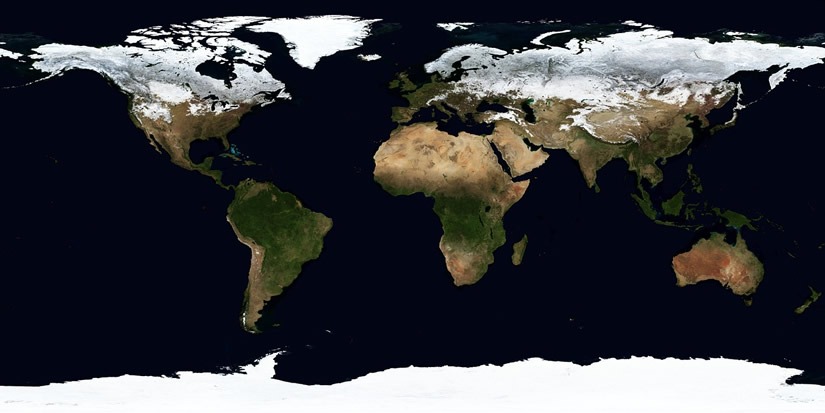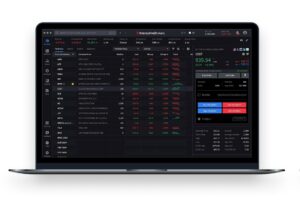At the end of Monday, the Dow Jones Index (US30) fell by 0.91%. The S&P 500 Index (US500) was down 0.23%. The Nasdaq Technology Index (US100) added 0.19%. The US stocks closed mostly lower on Monday as markets reacted to President Donald Trump’s escalating trade war with China, including a threat to impose additional 50% tariffs if Beijing does not back down from its retaliatory measures. Volatility rose across all asset classes: stocks, treasuries, and commodities were all buffeted by waves of conflicting headlines, including speculation of a 90-day tariff pause, which the White House quickly denied. The stock fell 20% over the week because of the company’s heavy reliance on China, where tariffs have reached 54%. Base tariffs of 10% on all US imports went into effect on Saturday, and additional duties, including tariffs of 20% on imports from the European Union, will be imposed on Wednesday.
The Mexican peso (MXN) weakened to 20.7 per US dollar, nearing a three-year low amid escalating global trade tensions and persistent domestic inflation weighing on the currency. Despite initial gains from tariff exemptions under President Trump’s 10% measures on imports, the peso has been hit after China imposed retaliatory 34 percent tariffs on US goods, adding to fears of a global recession and weakening external demand. The setback has been compounded by growing uncertainty over potential tariffs on US automobiles and deteriorating domestic indicators, including a sharp drop in consumer confidence in March and the ongoing challenge of high inflation.
The Canadian dollar weakened to $1.42, retreating from a recent four-month high, amid growing foreign trade uncertainty and signs of a fragile domestic economy. A sharp drop in crude oil prices to a four-year low has weighed on the commodity-linked Lonnie, as oil remains a key export for Canada. Political uncertainty ahead of the April 28 snap election further adds to risk aversion.
Equity markets in Europe were mostly down on Friday. Germany’s DAX (DE40) was down 4.13%, France’s CAC 40 (FR40) fell by 4.78%, Spain’s IBEX 35 (ES35) lost 5.12%, and the UK’s FTSE 100 (UK100) closed down 4.38%. European stocks fell for a fourth straight session on Monday, following a global equity sell-off triggered by President Trump’s latest tariff announcements. Sectors such as utilities, retail, insurance, financial services, oil and gas, and chemicals all fell more than 5%.
WTI crude futures reversed previous gains and fell to $60.7 a barrel, at its lowest level since April 2021, after speculation of a 90-day pause in new US tariff policy proved false. Investors remain on edge amid heightened volatility, fearing an escalating trade war could curb global growth and weaken energy demand.
Asian markets were predominantly down yesterday. Japan’s Nikkei 225 (JP225) was down 7.83%, China’s FTSE China A50 (CHA50) fell by 6.02%, Hong Kong’s Hang Seng (HK50) collapsed 13.22%, and Australia’s ASX 200 (AU200) was negative 4.23%.
The Australian dollar climbed above $0.60 on Tuesday after a sharp two-day drop amid improving market sentiment after US President Donald Trump signaled a willingness to engage in trade talks with key partners, fueling hopes of easing global trade tensions. US Treasury Secretary Scott Bessent added that about 70 countries have approached the White House to negotiate tariffs. However, trade tensions between the US and China remained elevated after Trump threatened to impose an additional 50% tariffs on Chinese imports. Beijing denounced the move as “blackmail” and vowed to defend its interests.
Indonesian consumer prices rose by 1.03% y/y in March 2025, reversing a 0.09% decline in the previous month but falling short of market consensus, which expected a 1.16% rise. This was the highest since December amid a rebound in spending during the Lenten month and ahead of the Eid al-Fitr holiday. Core inflation, which excludes food prices, came in at a 20-month high of 2.48%, below the 2.50% expectations.
This article reflects a personal opinion and should not be interpreted as an investment advice, and/or offer, and/or a persistent request for carrying out financial transactions, and/or a guarantee, and/or a forecast of future events.









